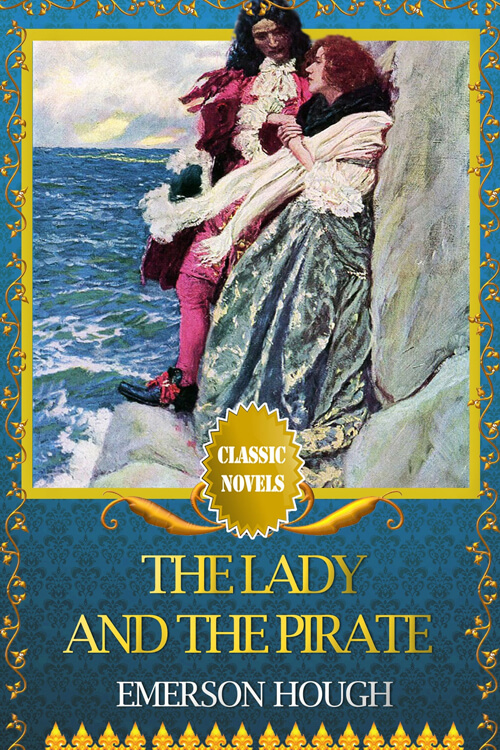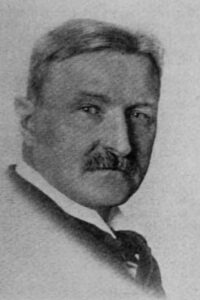
The Lady and the Pirate, Being the Plain Tale of a Diligent Pirate and a Fair Captive
Moreover, a peculiarly fine specimen of Anopheles, (as I took it to be) was at that very moment hovering over my hand, and I was anxious to confirm my judgment as well as to enlarge my collection of mosquitoes. I had my other hand in a pocket feeling for the little vial in which I purposed to enclose Anopheles if I could coax him to alight. Indeed, I say, I was at that very moment as happy as a man need be; or, at least, as happy as I ever expected to be. Imagine my surprise, therefore, at that moment to hear a voice, apparently intended for me, exclaim, “Halt! Caitiff!”
I looked up, more annoyed than displeased or startled. It is not often one sees so fine a specimen of Anopheles, and one could have sworn that, but for my slight involuntary movement of the hand, he must have settled; after which—crede experto!—he would have been the same as in my vial, and doomed to the chloroform within the next hour. Besides, no matter who one may be or how engaged, it is not wholly seemly to be accosted as a caitiff, when one is on one’s land, offending no man on earth, owing no debt, and paying no tribute, feudal, commercial, military or personal, to any man on earth.
The situation seemed to me singular. Had the time been some centuries earlier, the place somewhere in the old world, such speech might have been better fitting. But the time was less than a year ago, the place was in America. I was on my lands, in this one of our middle states. This was my river; or at least, I owned the broad acres on both sides of it for some miles. And I was a man of no slinking habit, no repulsive mien, of that I was assured, but a successful American of means; lately a professional man and now a man of leisure, and not so far past thirty years of age. My fly-rod was the best that money can buy, and the pages of the adjacent book were handsomely stocked by the best makers of this country and each of the three divisions of Great Britain; in each of which—as well as in Norway, Germany, or for the matter of that, India, New Zealand, Alaska, Japan or other lands—I had more than once wet a line. My garb was not of leather jerkin, my buskins not of thonged straw, but on the contrary I was turned out in good tweeds, well cut by my London tailor. To be called offhand, and with no more reason than there was a provocation, a “caitiff,” even by a voice somewhat treble and a trifle trembling, left me every reason in the world to be surprised, annoyed, and grieved. For now, Anopheles had flown away; and had I not been thus startled, I should certainly have had him.
Read or download Book
Emerson Hough
Emerson Hough (June 28, 1857 – April 30, 1923) was an American writer best known for writing Western stories and historical novels. His early works included Singing Mouse Stories and Story of the Cowboy. He was well known for his 1902 historical novel The Mississippi Bubble. Many of his works have been adapted into films and serial films.
Career
Hough was born in Newton, Iowa on June 28, 1857. He was in Newton High School’s first graduating class of three in 1875. He graduated from the University of Iowa with a bachelor’s degree in philosophy in 1880 and later studied law and was admitted to the bar in 1882. His first article, “Far From The Madding Crowd,” was published in Forest and Stream in 1882.
He moved to White Oaks, New Mexico, practiced law there, and wrote for the White Oaks newspaper Golden Era for a year and a half, returning to Iowa when his mother was ill. He later wrote Story of the Outlaw, A Study of the Western Desperado, which included profiles of Billy the Kid and Pat Garrett. Hough moved to New Mexico after Garrett shot Billy the Kid, and he became a friend of Garrett. He wrote for various newspapers in Des Moines, Iowa, Sandusky, Ohio, Chicago, Illinois, St. Louis, Missouri, and Wichita, Kansas. In 1889 he got a position as western editor of Forest and Stream, editing the “Chicago and the West” column. He was hired by George Bird Grinnell, the owner of Field and Stream, who founded the Audubon Society in 1886 which, along with Theodore Roosevelt’s Boone and Crockett Club, was a leader in the conservation movement.
Hough was also a conservationist. One of his projects for Forest and Stream was to survey Yellowstone National Park in midwinter 1893, with a guide and 2 soldiers from the nearby fort of the same name. There were supposed to be more than 500 buffalo there, but their count barely reached 100. Due to Hough’s report, eastern newspapers took up the cause against poaching, and in May 1894 the U.S. Congress passed a law making poaching of game in national parks a punishable offense. Later, he and other Saturday Evening Post writers wrote a letter for Stephen Mather and George Horace Latimer to sign, advocating the creation of a national park system. The National Park Service was created in 1916. In addition, he was a co-founder of the Izaak Walton League, an organization of outdoorsmen, in 1922. He wrote the “Out-of-Doors” column for the Saturday Evening Post and these columns later appeared in book form.
In 1902, Hough began his association with Bobbs-Merrill Company (then Bowen-Merrill), which published his first best-seller, The Mississippi Bubble. Hough began a trilogy on America when he published 54-40 or Fight in 1909, dedicated to Theodore Roosevelt. He dedicated the second volume, Purchase Price, to U.S. Senator Albert Beveridge of Indiana in 1910 and the third, John Rawn, to Woodrow Wilson in 1912. He nevertheless campaigned for Theodore Roosevelt, candidate of the Bull Moose Party, in the 1912 presidential election.
Reviewers noted the political nature of Hough’s Western fiction. One reviewer wrote that John Rawn was “not a novel at all; it is an arraignment; it is propaganda” for progressive Republicans or the Democrats. It condemned protective tariffs and presented a consistently negative portrait of money-driven characters. The review was positive, praising the novelist’s portrait of his main character, but little else. Hough “makes his point, and hammers it hard. He leaves nothing for the reader to guess…He goes at it all with bludgeon and battle-ax…He has, as a fighter, a strong style. His book is well worth reading. But it is not art.” Hough responded at length and with good humor, citing widely divergent views of the novel. He explained that a story of “blackguards and traitors” should not lead anyone to the conclusion that he believes such characters typify American society, rather that “imitation of blackguards and traitors is not a fit ambition for Americans.”
He took a public position during the election of 1916, adding his name to a letter sent on behalf of the Roosevelt Authors’ League pledging support to Theodore Roosevelt because “the international crisis makes your re-election to the Presidency essential to the ultimate welfare of our country.” It praised “the splendid fight you are making for Americanism” and had harsh words for the administration of Woodrow Wilson.
His other notable works included Story of the Cowboy, “which received a high recommendation from President Theodore Roosevelt,” Way of the West, Singing Mouse Stories, and The Passing of the Frontier. Among his historical novels, The Magnificent Adventure in 1916 was set at the time of the Louisiana Purchase and the Lewis and Clark Expedition and told, said one reviewer, “a good stirring tale.”
In 1889 Hough wrote Madre D’Oro, a four-act spectacular drama about the Spanish conquest of the Aztecs. With L. Frank Baum, author of The Wonderful Wizard of Oz, created two play treatments: The Maid of Athens: A College Phantasy and The King of Gee-Whiz. Neither was ever completed or staged.
He also wrote autobiographical works, such as “Getting a Wrong Start”, published anonymously as a serial in the Saturday Evening Post in 1913. It appeared in book form two years later. He then wrote “Emerson Hough Himself-by Himself” for the Post in 1917.
Hough wrote the official account of the activities of the American Protective League (APL), a voluntary organization that attempted to enforce patriotism and stifle dissent during World War I. Called The Web: A Revelation of Patriotism, it told the history of that controversial organization in glowing terms and called for a program of “selective immigration, deportation of un-Americans, and denaturalization of ‘disloyal’ citizens and anarchists.” It said: “We must purify the source of America’s population and keep it pure.” When the APL organized teams of vigilantes to enforce the military draft, Hough described the places the organization was most needed: “We find that the great states of each coast are practically foreign – New York most of all.” During the war he wrote a pamphlet for a similar organization, the American Defense Society, called The Indefinite American Attitude Toward the War and When Shall It End?






